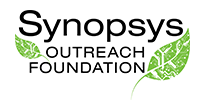Read the ISEF Rules and Guidelines before you start your project.
As an ISEF affiliated fair, the Synopsys Championship follows ISEF Rules and uses ISEF forms where possible. SCVSEFA has some requirements and forms that are specific to the Synopsys Championship.
MINIMUM QUALITY REQUIREMENTS for Projects
Find the type of project you are doing from the list below and review the minimum requirements for project acceptance. Make sure that the information described in the requirements list is included in your Research Plan. Detailed templates for research plans are linked to the Required Forms page.
Types of Science Fair Projects
Science Project: investigates the effects of changes or answers the question “Why?”
Engineering Project: solves a need or problem; includes measures of success.
Product Testing Project: (grades 6-8 only) tests and compares similar items using quantitative endpoints.
Human Participants Project: SCVSEFA no longer accepts Behavioral Science projects using humans. Projects involving humans to test an engineering prototype or app will be accepted if pre-approved by the IRB. In addition to your Research Plan any project that involves humans also needs a Human-Participants Research Plan.
Data Analysis Project: Data analysis projects using data from a single experiment conducted by other scientist(s) are considered team projects where the team includes the individual(s) conducting the experiment and the data analyst. As such, these projects are subject to the rules governing team projects (see information regarding teams and eligibility).
Demonstration Project: shows how something works [not accepted at this fair].
Literature reviews: These are not accepted.
Science Project minimum requirements
- Subject which defines a testable question that begins Why… or What is effect of a change in X on Y? (for example, what is the effect of a change in the amount of sunlight on the growth of tomato plants).
- Bibliography that includes references from your literature research.
- Hypothesis based on your library research and knowledge. It is your best estimate of what will happen.
- Experimental design
- Define a control (a “standard” group) to which all test groups will be compared.
- Define test groups where only one variable differs from the “control” group.
- Define the quantitative endpoint(s) (something you can measure).
- Each test group should contain a minimum of 3 objects being tested (seed, plant, rat, etc.).
- Plan to change only one variable in each test cycle. However, change the variable in several ways (several concentrations of a chemical, several temperatures, or several time points etc.).
- Report measurements in metric units when possible.
- Repeat the test more than once to see if your results are reproducible.
Engineering Project minimum requirements
- Clearly define the problem or need the engineering project will solve.
- Include Bibliography from your literature research.
- List design criteria and design constraints
- Design criteria = physical and functional characteristics of the design (shape, weight, etc).
- Design constraints/limitations (cost, time, available materials, etc).
- Clearly state success criteria. What will you measure (quantify) to see if your design worked?
- Report measurements in metric units where possible.
Product Testing Project minimum requirements [Grades 6 -8 only]
- Clearly identify what kind of item (soap, fabric, etc.) you plan to test.
- Define a test group of at least three (Grades 6 and 7) or four similar items (Grade 8 ).
- Include test criteria that:
- Define what will be measured.
- Describe how you will take measurements.
- Report measurements in metric units, when possible.
- Define criteria for “the best” (cleanest, largest, coldest, etc).
- Repeat the test more than once to see if your results are reproducible.
Human Participants Projects
SCVSEFA no longer accepts Behavioral Science projects involving humans, i.e. projects that look at the effects of various things on human participants. However, if you are developing an app or have an engineering project that builds a device that needs to be tested, you may do so if you follow the rules for human participants and request IRB pre-approval.
Please be aware when doing any project that involves physical or mental disease that projects that are not completed under the direction of a qualified medically certified supervisor may not claim to diagnose or treat a medical or mental health condition. Apps designed for this purpose may not be tested by volunteers or family members. Judges may not use such an app that is connected to the internet. Projects, products, apps may claim to have the “POTENTIAL” for therapeutic effectiveness or clinical diagnostics only. The Claim to cure or definitively diagnose a medical condition can ONLY be made after completing clinical studies, using protocols approved by government agencies such as the FDA. These projects require SRC pre-approval.
Detailed ISEF Guidelines are available from the ISEF website.
- Use the Human Subjects Detailed Research Plan.
- Include a complete sample test or sample Informed Consent Form for SRC review.
- Subjects may not be asked to ingest foods without proper medical supervision and/or as a reward for participation.
- Have at least 10 human participants and have a quantifiable, measurable endpoint.
- Projects usually need to specifically address issues of randomization of trials (not mixing up treatments, or ignoring learning from participating previously).
- Participants may not be given rewards for participation (grades, prizes, money, food, etc).
Demonstration Project show or explain “how something works“
Demonstration projects are NOT accepted at the Synopsys Championship. What interests you about your demonstration project? Can you channel your interest into a Science, Engineering, or Product Testing project? Ask your teacher for help. A demonstration often can be turned into an experimental project by asking how something (another factor) affects the functioning of the item. Also, if you like to build things, a demonstration might become an engineering project.

